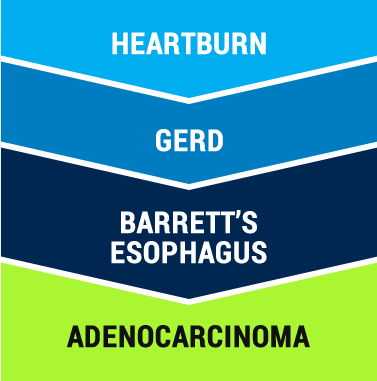Finally live without the annoyance — and danger — of heartburn.
If you suffer from gastroesophageal reflux disease (GERD), commonly referred to as acid reflux, diagnosis and treatment is your best protection against progressive damage and irritation. GERD can lead to an irritated food pipe (called the “esophagus”), and if left unchecked, your symptoms will usually worsen over time. Fortunately, you can often relieve your discomfort with a few simple lifestyle adjustments. Here are a few of the most common symptoms of GERD:
- A burning sensation that can run from your throat to the center of your chest (generally known as “heartburn”)
- Regurgitation of food or sour liquid
- Chronic, dry cough
- Difficulty swallowing
- Sensation of a lump in your throat
- Hoarse or sore throat
If you have any of the symptoms listed above, schedule an appointment to determine the best course of treatment for you.
Trust our experts to assess your GERD and stop its progression.
GERD is caused by weakness in your lower esophageal sphincter (LES). The LES is a circular muscle that allows passage of food from your esophagus to your stomach. When your LES is weak, stomach acid can flow backward (reflux) into the esophagus, where it doesn’t belong.
Over time, regular exposure of your esophagus to stomach acid can cause inflammation and narrowing, and even change its cell composition, a condition called Barrett’s esophagus. With Barrett’s esophagus, the normal cells in your esophagus will change into cells that resemble those found in your small intestine. And this cellular change increases your risk of developing esophageal cancer. Here are some of the risk factors for Barrett’s esophagus and esophageal cancer:
- Age 55 or older
- Male
- Overweight or obese
- Heavy alcohol use
- Any tobacco use
- Chronic, long-term acid reflux/GERD

Medications can reduce discomfort caused by acid reflux.
We’ll typically prescribe medication in cases of mild to moderate GERD. Here are a few different types of medications that can alleviate acid reflux symptoms:
- Antacids – Common brand names include Tums® and Maalox®. Antacids reduce the acidity level of your stomach content, and less acidity means less damage to your esophagus.
- H2 blockers – Cells in the lining of the stomach release a chemical called “histamine” to tell other cells to start making stomach acid. H2 blockers stop these acid-producing cells from responding to histamine, reducing the amount of acid in your stomach.
- Proton pump inhibitors (PPIs) – These medications interfere with a stomach enzyme responsible for acid production, reducing the amount of acid your stomach creates. PPIs are the most powerful medications available to treat acid reflux.
Chronic acid reflux cases should be evaluated by one of our board-certified gastroenterologists.
If you’ve had persistent acid reflux symptoms for over 5 years, you should see one of our specialists immediately. (Schedule Now) We’ll perform thorough testing to determine the health of your esophagus, and then plan out a custom treatment plan. At GCSA, we offer a variety of advanced procedures to diagnose and treat your acid reflux. Some of these techniques include:
Esophagogastroduodenoscopy (EGD or “upper endoscopy”)
Using a long, flexible tube with a camera on the end (called an “endoscope”), your doctor will explore your esophagus, stomach and duodenum (the first part of your small intestine) to look for signs of damage or disease. To maximize your comfort, you’ll be sedated throughout the procedure, and we’ll apply an anesthetic to the back of your throat to quiet your gag reflex. During the procedure, your doctor may take a small biopsy of your esophagus to check for the presence of precancerous or cancerous cells. Read more…
Bravo pH Monitoring
This advanced tool allows us to diagnose GERD with minimal inconvenience. Your doctor will attach a small capsule to the inside of your esophagus (no puncture) in a simple office procedure. Over the next 48 hours, you will wear a small receiver about the size of a pager (removable for showering and sleeping). Your capsule will continuously measure the acidity of your esophagus and wirelessly transmit the data to the external receiver. Your doctor will then analyze the data to confirm elevated acidity in your esophagus, a sign of GERD.
High Resolution Impedance Manometry
Your doctor will carefully insert a thin, flexible tube through your nose, down your esophagus and into your stomach. You’ll then be asked to swallow a small amount of water. The computer will measure the contraction strength and pattern of your LES. Weak or irregular contractions of this muscle are the primary cause of GERD. No sedation is necessary, but we will apply some numbing gel to your nose for enhanced comfort.
HALOTM/BarrxTM Radiofrequency Ablation
We can actually turn your abnormal Barrett’s esophagus cells back to normal esophageal cells using this high-tech procedure. Performed at the same time as an upper endoscopy, your doctor will insert a small tube down your esophagus. At the end of this tube is a balloon, which inflates and emits controlled bursts of heat, destroying the abnormal cells. In their place, your body will regenerate healthy cells.
Sometimes, GERD isn’t responsible for your symptoms. We can find the right answer to solve your discomfort.
While the most common cause of esophageal symptoms is GERD, it isn’t the only one. Another condition called achalasia can bring on similar symptoms. While this condition is rare, it is serious. People with achalasia have an esophagus that is unable to move food through normal rhythmic muscular contraction, called peristalsis. This condition can generally be fixed with a minimally invasive surgical procedure. Our specialists work with some of the top surgeons in San Antonio, and we’ll make sure you get the treatment you need.
Well-trained gastroenterologists providing heartburn relief through advanced diagnostic and treatment techniques.
Our physicians perform over 27,000 endoscopic procedures every year, giving them the experience and skill necessary to identify and treat your GERD or other esophageal conditions. We perform all of these endoscopic procedures on an outpatient basis, meaning you can return home the same day and get back to your life almost immediately. While many GERD cases won’t require an endoscopy, it’s important to see a compassionate specialist who can help manage your condition, no matter the severity.
To schedule an appointment or learn more about how Gastroenterology Consultants of San Antonio specializes in acid reflux treatment in the San Antonio communities of Medical Center, Stone Oak, Northeast, Westover Hills, Boerne or Bulverde, call 210.614.1234 today. You can also request an appointment online here.
Esophageal Clinic Testimonials
“I was referred to Dr. Piesman by my PCP after having acute pancreatitis with pain that wouldn’t go away. I had a telemedicine visit with him first and he prescribed a medication to see if symptoms would resolve and indicated I would need an endoscopic procedure done. After my symptoms did not resolve completely he scheduled the endoscopy the following week which was amazing because those procedures are hard to fit in since they’re done in the hospital. I had my endoscopy done and Dr. Piesman was extremely nice but professional and reassuring. I was nervous but he put me at ease. After my procedure, I was told I had GERD, the beginning of fatty liver, a hiatal hernia, and Barrett’s esophagus which is a pre-cancerous condition. I’m only 36 and am so happy my PCP referred me to the best gastroenterologist in San Antonio TX. Without Dr. Piesman I would’ve never known about these other conditions. Now with work to put in of course I can be cognizant of my conditions and make better life choices. I’ll have an endoscopy yearly and a medication I’ll take daily. I highly recommend Dr. Piesman for any gastrointestinal issues. He’s very pleasant, professional, and truly the best in his field.” -April
“I was so not looking forward to my first colonoscopy and GERD test. I was pleasantly surprised by the friendly and caring staff during this visit. My anxiety quickly melted away. When I was brought into the operating room I felt like I was taken into a spa. The lights were low, the communication between the doctors, anesthesiologist, and nurse was soft and calming. A few moments later I woke up in the recovery room. Although I was warned ahead of time that there may be discomfort and slight bleeding afterward I experienced neither. Thank you, Dr. Singson. The experience was very pleasant.” – Greg














